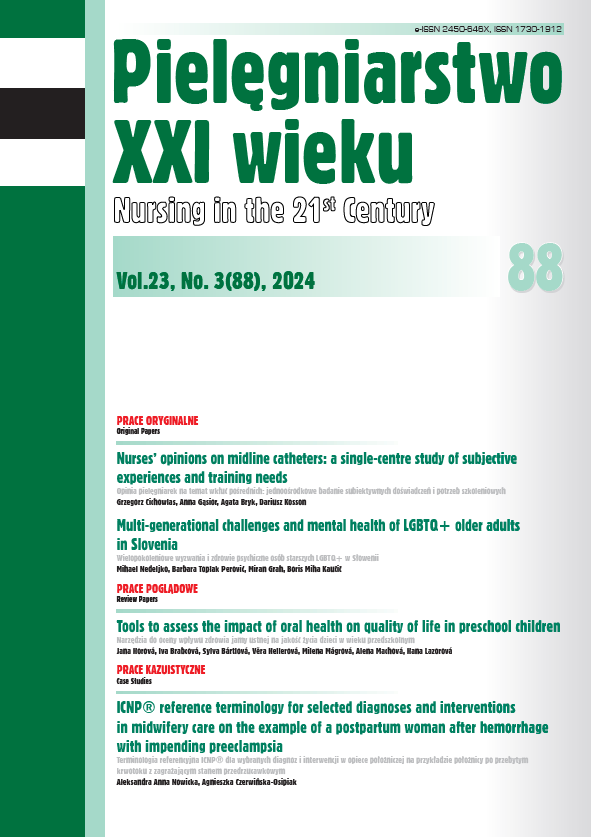Evidence-Based Practice (EBP) in the Professional Practice of Nurses
DOI:
https://doi.org/10.2478/pielxxiw-2024-0028Keywords:
nursing, nursing process, professional practice, Evidence-Based PracticeAbstract
EVIDENCE-BASED PRACTICE (EBP) IN THE PROFESSIONAL PRACTICE OF NURSES
Aim. The purpose of this study was to analyze the application of Evidence Based Practice (EBP) in the professional practice of nurses..
Material and methods. The study involved 151 active professionals in the nursing profession. The study was conducted using the diagnostic survey method, the tool was the Standardized Evidence-Based Practice Profi le Questionnaire (EBP2Q), Polish adaptation: M.Pańczyk (2017). A 5% error of inference and an associated signifi cance level of p<0.05 were assumed.
Results. The lowest scores were obtained by the respondents on the subscale Frequency of use of specifi c elements of Evidence-Based Practice in daily clinical work (M=21.5 points, 47.8% of the maximum score), and on the subscale Knowledge of knowledge of research terminology (M=45.5 points, 53.5% of the maximum score). Statistically signifi cant associations were found between age, education, seniority of the subjects and the studied aspects of EBP (p<0.05).
Conclusions. 1. The application of EBP in the professional practice of nurses is at a low and insuffi cient level. 2. Nurses present a low level of knowledge related to EBP topics. 3. Along with their younger age, higher level of education, shorter length of service of the subjects, EBP was signifi cantly more frequently used in the daily practice of the subjects..
References
1. Grove SK, Gray JR, Burns N. Understanding Nursing Research. Buliding an Evidence-Based Practice. St Louis, Missouri: Wydawnictwo Elsevier; 2019.
2. Guyatt G, Cairns J, Churchill D, et al. Evidence-based medicine. A new approach to teaching the practice of medicine. JAMA. 1992; 268(17): 2420-2425. doi:10.1001/jama.1992.03490170092032.
3. Serafin L, Sak-Dankosky N, Wesołowska-Górniak K, i wsp. Badania naukowe w pielęgniarstwie. Wrocław: Wydawnictwo Edra Urban & Partner; 2022.
4. Kędra E. Praktyka pielęgniarska oparta na faktach – wymóg czy konieczność? Problemy Pielęgniarstwa. 2011; 19(3): 391-395.
5. Pańczyk M, Belowska J, Zarzeka A, et al. Validation study of the Polish version of the Evidence-Based Practice Profile Questionnaire. BMC Med Educ. 2017; 17(1): 38. doi: 10.1186/s12909-017-0877-4.
6. Rozporządzenie Ministra Nauki i szkolnictwa Wyższego z dnia 26 lipca 2019 r. w sprawie standardów kształcenia przygotowującego do zawodu lekarza, lekarza dentysty, farmaceuty, pielęgniarki, położnej, diagnosty laboratoryjnego, fizjoterapeuty i ratownika medycznego (Dziennik Ustaw 2019, poz. 1573).
7. Programy Kształcenia Podyplomowego Pielęgniarek i Położnych. Centrum Kształcenia Podyplomowego Pielęgniarek i Położnych. https://ckppip.edu.pl/ (dostęp 21.05.2024r.).
8. Belowska J, Panczyk M, Zarzeka A, et al. Promoting evidence-based practice – perceived knowledge, behaviours and attitudes of Polish nurses: a cross-sectional validation study. International Journal of Occupational Safety and Ergonomics 2020; 26(2), 397-405. doi: 10.1080/10803548.2018.1489993.
9. Gotlib J, Belowska J, Panczyk M, i wsp. Wiedza i postawy pielęgniarek wobec wykorzystywania wyników badań naukowych w codziennej praktyce klinicznej - doniesienia wstępne. Problemy Pielęgniarstwa. 2014; 22(2): 281-287.
10. Mędrzycka-Dąbrowska W, Gutysz-Wojnicka A, Basiński A, i wsp. Obecna praktyka i postrzeganie barier stosowania Praktyki Opartej na Dowodach (Evidence-Based Practice, EBP) przez pielęgniarkę w optymalnym leczeniu bólu u osób w wieku podeszłym – badania wstępne. Ból. 2016; 17(4): 11-19.
11. Kosiorek K, Gotlib J. Ocena wiedzy i postaw wobec praktyki zawodowej opartej na dowodach naukowych wśród położnych. Współczesne Pielęgniarstwo i Ochrona Zdrowia. 2018; 7(1): 3-10.
Downloads
Published
Issue
Section
License
Copyright (c) 2024 Authors

This work is licensed under a Creative Commons Attribution 4.0 International License.




